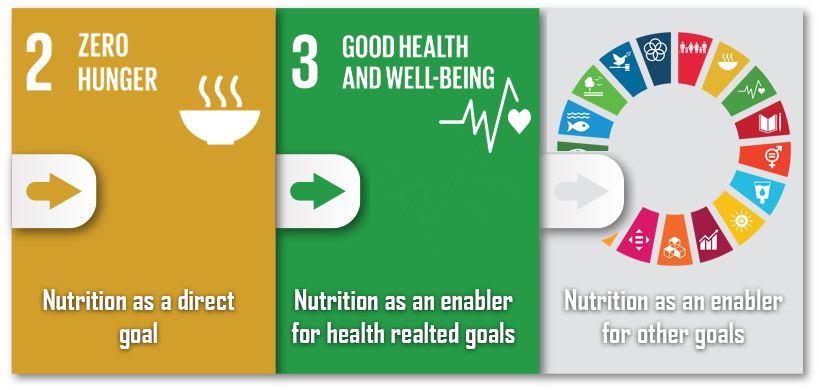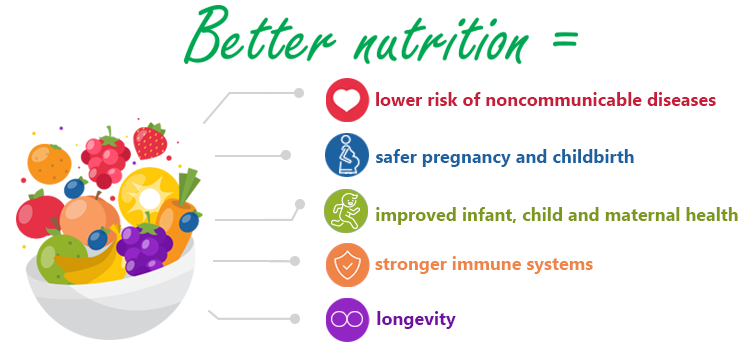
We are one of several technical programmes in the Department of Noncommunicable Diseases and Mental Health at the WHO Regional Office for the Eastern Mediterranean in Cairo, Egypt. We provide advice, as well as technical and programmatic support to 22 countries in WHO’s Eastern Mediterranean Region, to help them take action to improve nutrition to support health and wellbeing for all, at all ages, and to meet Sustainable Development Goal 2 (zero hunger) and Target 3.4 (reduce deaths from noncommunicable diseases and promote mental health), as well as other regional and global commitments within the UN Decade of Action on Nutrition. We support the development and implementation of evidence-based and feasible interventions to promote healthy diets, address the risks posed by all forms of malnutrition from the earliest stages of development, and strengthen the responses that the health system can give directly and through its influence on other sectors, particularly the food system.

Nutrition is a critical part of health and development. Better nutrition is related to improved infant, child and maternal health, stronger immune systems, safer pregnancy and childbirth, lower risk of noncommunicable diseases (such as diabetes and cardiovascular disease), and longevity. Healthy children learn better. People with adequate nutrition are more productive and can create opportunities to gradually break the cycles of poverty and hunger. Malnutrition, in every form, presents significant threats to human health. Today the world faces a double burden of malnutrition that includes both undernutrition and overweight, especially in low- and middle-income countries.

Our goal
To strengthen efforts to: improve nutrition throughout the lifecourse, including for mothers, infants, children, adolescents and older people; prevent undernutrition, overweight, obesity and diet-related noncommunicable diseases (such as diabetes and cardiovascular disease); and support and protect nutrition in emergency situations.
Scale up action on malnutrition in all its forms
We have a wealth of evidence-based tools and guidance to help you respond to the double burden of malnutrition in the Region, which is accounted for by the rising rates of overweight and obesity, and diet-related noncommunicable diseases (such as diabetes and cardiovascular disease), as well as the prevailing emergency situation in many countries where they continue to experience high levels of food insecurity, undernutrition and micronutrient deficiencies. Here are our key tools and guidance, which are cost-effective, feasible and affordable.
Strategy on nutrition for the Eastern Mediterranean Region 2020–2030
This comprehensive nutrition strategy establishes a framework for efforts to reach agreed targets on nutrition, diet-related noncommunicable diseases (such as diabetes and cardiovascular disease) and sustainable development, as well as to guide implementation of the remainder of the United Nations Decade of Action on Nutrition in the Region.
United Nations Decade of Action on Nutrition
The UN Decade of Action on Nutrition is a commitment by United Nations Member States to undertake 10 years of sustained and coherent implementation of policies, programmes and increased investments to eliminate malnutrition in all its forms, everywhere, leaving no one behind. The Decade will increase visibility of nutrition action at the highest level and ensure coordination, strengthen multi-sectoral collaboration, create synergies and measure progress towards sustainable food systems and food and nutrition security for all.
Regional framework for action on obesity prevention 2019–2023
The regional framework will help countries scale up action on obesity prevention in the Eastern Mediterranean Region. It translates a series of policy priorities into regional commitments. The regional framework recommends strategic interventions and progress indicators in relation to fiscal measures, public procurement, food supply and trade, labelling, marketing, physical activity, mass media campaigns, breastfeeding, reformulation, health sector interventions, assessment and monitoring.
More on Nutrition programme
The WHO Nutrition programme is one of several technical programmes in the Department of Noncommunicable Diseases and Mental Health at the WHO Regional Office for the Eastern Mediterranean in Cairo, Egypt. The Programme is managed by a regional adviser, who is based in the Regional Office. The adviser works closely with core teams, including communications and surveillance, as well as with WHO headquarters in Geneva, other regional offices in Africa, the Americas, Europe, South-East Asia and the Western Pacific, as well as 22 country offices, ministries of health, collaborating centres and national and international partners, as well as individuals and communities to:
strengthen national capacities in countries for formulating and implementing national food and nutrition strategies and plans of action to improve the nutrition status of the population and address emerging nutrition challenges and transitions;
improve the micronutrient status of the populations of countries through innovative programmes of food supplementation and food fortification with micronutrients of public health significance;
strengthen and improve national capacities of countries to respond to the nutrition needs of populations living under both normal and complex emergency situations;
provide technical support to countries of the Region to establish technical and programmatic collaboration with partners at global, regional and national levels to promote intersectoral action on food and nutrition;
develop regional and national-level standardized guidelines and protocols for the detection, prevention, management and monitoring of all forms of malnutrition;
support the introduction and implementation of the new WHO growth standards in countries;
establish and strengthen nutrition databases and surveillance systems on the major forms of malnutrition in countries.
WHO Collaborating Centres
2 institutions in 2 countries supporting WHO’s Nutrition programme.
WHO collaborating centres are institutions such as research institutes, parts of universities or academies, which are designated by the Regional Director to carry out activities in support of the Organization's programmes. Currently, there are two WHO collaborating centres in two countries working with WHO on the area of nutrition.
Related links
Department of Noncommunicable Diseases and Mental Health
Sustainable Development Goal 2: Zero hunger
Sustainable Development Goal 3: Ensure healthy lives and promote well-being for all at all ages
WHO regional collaborating centres
WHO global collaborating centres
WHO collaborating centres database
Contact the Regional Office team

Dr Ayoub Al-Jawaldeh
Regional Adviser
Nutrition Programme
Department of Noncommunicable Diseases and Mental Health
Work: +2 02 227 653324
Email:
This e-mail address is being protected from spambots. You need JavaScript enabled to view it

Ms Nashwa Mansour
Programme Assistant
Nutrition Programme
Department of Noncommunicable Diseases and Mental Health
Work: +202 227 65376
Email:
This e-mail address is being protected from spambots. You need JavaScript enabled to view it




